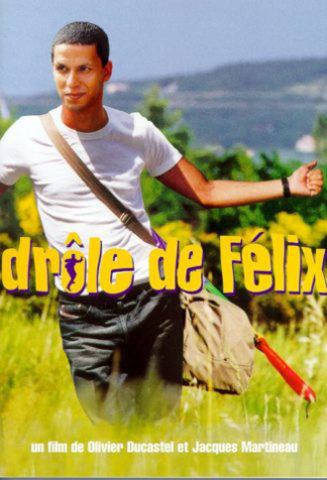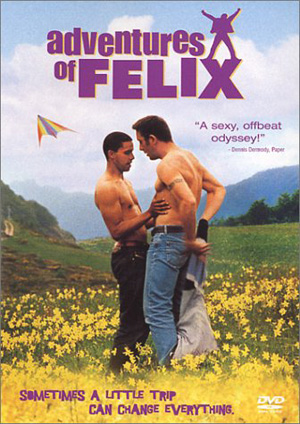 Adventures of Felix (Drôle de Felix)
Adventures of Felix (Drôle de Felix)
Written and Directed by Olivier Ducastel and Jacques Martineau
Released April 19, 2000 (France)
Drama (romance)
95 min.
Review by Stephen O. Murray
August 14, 2001.
At the start of Drôle de Felix (Adventures of Felix), the half-Arab Felix [Sami Bouajila] is bicycling through a Norman town (Dieppe) to where he has been working as a barman on a ferryboat across the English channel. With the opening of the Channel, he has been laid off. Going through papers of his recently deceased (Norman) mother, he finds the address in Marseilles of the father who abandoned him and his mother at birth.
Being around all day he is bored and his presence (and, in particular, watching a soap opera he saw every morning at work on the boat) disrupts his teacher lover Daniel [Pierre-Loup Rajot]. Felix decides to go meet his father, though Daniel is the first of many who warns him that if his father wanted to see him he would have done so some time during the last quarter century. Felix visits the local HIV clinic to stock up on his medications (Crixivan and Combinivir). There, he and another gay man reassure a woman that a triple-drug combination is not the final step in HIV treatment.
I have to say that I find it very strange that someone who has been living in Normandy his whole life does not have an umbrella, and that the only one Felix can find to buy is a flamboyant rainbow one. I thought that it was going to be an issue and/or a weapon later on, but he only carries it along everywhere.
Deciding to make the trip an adventure, Felix avoids taking public transportation or freeways. I don’t know why it takes him the whole first day and part of the night to get only to Rouen—to which he could have bicycled in a few hours. There—quite close to home—he witnesses a beating and is threatened to keep quiet.
He skirts Paris and the next evening arrives in Chartres. He finds the 17-year-old Jules [Charley Serue] trying to draw a relief of Aristotle from the facade of the cathedral, helps him, and spends the night in Jules’s bedroom, ignoring Jules’s desire for sex.
The next day they “borrow” a car, find that there is a baby in the backseat, get the baby back to its mother and continue south. After being ejected from a gay disco when the owner discovers Jules is only 17, Felix admonishes Jules not to pout, that there will be other men in his life whom he wants but who refuse to have sex with him. Jules does not want to be a little brother, and Felix continues alone.
He is picked up by a feisty old woman [Patachou, a chanteuse who appeared in Jean Renoir’s French Can-Can], determined to enjoy her widowhood, then by a hunky railroad worker [Philippe Garziano] who is a kite aficionado (who gives him a kite to match his umbrella, gets it on with him in some poison ivy, and anoints him in shallot vinegar to relieve the itching), and helps Isabelle [Ariane Ascaride] change a tire after which she gives him a ride as she drops off three of her children to their three separate fathers in the Loire Valley.
Finally, he reaches the Mediterranean, where an elderly fisherman [Maurice Benichou] tells him about fishing to fish rather than to catch anything, again suggests that the purpose of Felix’s journey is dubious, and gives him a ride into Marseilles.
 The film ends with Felix and Daniel on a ferry—en route to Corsica. I don’t want to fill in all that happens en route, but recurrent concerns include racist violence and non-normative families, including the rejection of the older woman of her deceased husband and alive (if not living) son and the insistence by one of the children being distributed to their biological fathers for the weekend that whoever is with his mother (including, at that moment, Felix) is one of his fathers.
The film ends with Felix and Daniel on a ferry—en route to Corsica. I don’t want to fill in all that happens en route, but recurrent concerns include racist violence and non-normative families, including the rejection of the older woman of her deceased husband and alive (if not living) son and the insistence by one of the children being distributed to their biological fathers for the weekend that whoever is with his mother (including, at that moment, Felix) is one of his fathers.
The filmmakers, Olivier Ducastel and his life-partner Jacques Martineau, label segments with kinship terms such as “my grandmother,” etc. Except for casting Jules as “my younger brother,” it does not seem to me that Felix sees his brief encounters on the road as a family he is constructing—compared, say, to Art Carney’s Tonto in Paul Mazursky’s Harry and Tonto. Felix and those he spends time with develop feelings and give advice—and suggest that family is overrated, but Felix persists in journeying toward his unknown father.
As road movies go, Drôle de Felix is more like Harry and Tonto than Kings of the Road or Easy Rider or other ones with two main characters (like It Happened One Night or the last Yves Montand film with a younger Arab boy on the road, IP5). Harry goes to visit offspring and has a cat along, but there is something of the same humor, similarly quirky characters encountered en route, and similarly engaging protagonist travelers.
Felix has his sorrows but also considerable joie de vivre, a dazzling smile, and kissable lips. The lips are locked to those of several male characters over the course of the film. There is also brief, incidental male nudity. I gather that these scenes alarm some people. There are no sex scenes: one sexual encounter clearly occurs, but off-camera.
Felix’s homosexuality and HIV+ status are established early and the film is not about problems stemming from either of these statuses. Two of the three longest (in screen time) relationships are with straight women and the least developed segment is the fictive “cousin” of the sexual interlude.
I enjoyed the French countryside scenery, the delightfully individuated characters met on the way (especially Patchou telling him she was staring at him, because it has been a long time since she has seen a naked male body—and his is one that rewards the gaze), and the warm but vulnerable title character.
published on epinions 14 August 2001
©2001, 2016, Stephen O. Murray

